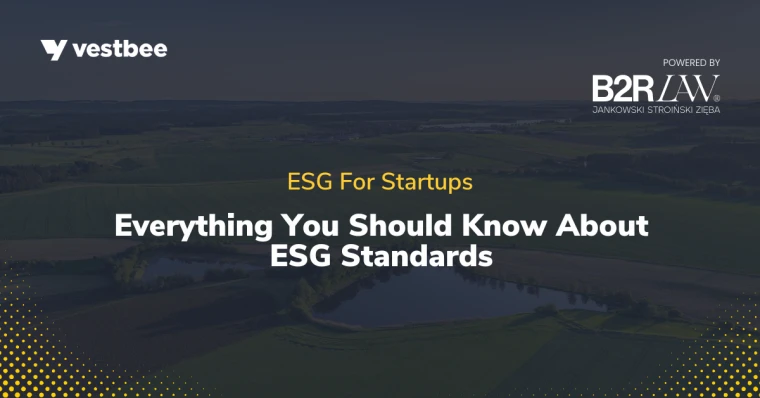For the last months, we have been privileged to discuss with you various aspects and shades of Environmental, Social and Governmental trends (ESG) in VCs and startups reality.
We have started with general remarks on improving investibility of a startup via focusing on ESG alignment.
Then, we explained how ESG investment strategy may be planned, introduced and followed by presenting the standards of ESG due diligence examination process and new EU requirements on that topic as well as possible ways to improve ESG metrics. A commentary on redefining supply chains to align them to the ESG requirements was also highlighted as an important element of ESG ecosystem.
Summing up came by way of commentary on how to outperform competitors via ESG improvements.
So now, the time has come to wrap up our series of articles on ESG.
What does ESG mean?
ESG stands for environmental, social and governance metrics. The European Union has stressed the importance of sustainability in terms of E (Environment), S (Social) and G (Governance) - in 2020, it introduced a new law, known as Taxonomy which is a classification system of environmentally sustainable economic activities.
The Taxonomy establishes 6 environmental objectives:
- Climate change mitigation
- Climate change adaptation
- The sustainable use and protection of water and marine resources
- The transition to a circular economy
- Pollution prevention and control
- The protection and restoration of biodiversity and ecosystems
At the moment, ESG reporting is mandatory for large public-interest companies with more than 500 employees (including listed companies, banks, insurance companies and other companies designated by national authorities as public-interest entities). These firms are obliged to publish information related to environmental & social matters and the treatment of employees reflected in respect for human rights, anti-corruption and bribery and diversity on company boards (in terms of age, gender, educational and professional background).
Why should startups and VC funds care for ESG?
For the purpose of fulfilling their own ESG policies and requirement, the big companies are interested in ESG alignment of their cooperators and subcontrators (more on that here). Therefore, ESG is quickly becoming a must for smaller companies as well as the big ones.
Moreover, financial market players take ESG metrics into accounts not only by allocation of certain quotas in credit products / investments for ESG-aligned companies, but also by impact investments (or socially responsible investments, SRI).
From that perspective, startups and scaleups should be interested in ESG alignment for the purpose of both expanding business and providing financial means for growth. VC funds alike, broaden the range of potential coinvestors or exit partners through proper management of ESG metrics.
How to become ESG-aligned?
The Taxonomy provides certain rules that explain how the ESG metrics should be applied. Namely, a business can be qualified as sustainable (ESG-aligned) if it:
- significantly contributes to at least 1 of the environmental objectives;
- also does not harm any of the 6 environmental objectives; and
- complies with minimum social and governance safeguards (i.e. human rights, employment law).
Therefore, each company should start by analyzing its business in the view of the six environmental objectives and choosing its own approach towards them that takes into account company’s size, field and mission. For this purpose, a self–due diligence is advised to be performed, as thanks to such in-depth investigation a business strategy is likely to be successful.
You know your business best - the space for improvement or even a change can be found in internal processes, cooperations, supply chain or stakeholders.
As you get more involved into the process, the number of questions multiplies. This is therefore advisable to get the full picture of ESG-related landscape and steer your business through the factors of various importance to it. Also, when it comes to the detail, you can always seek professional advice.
Related Posts:
ESG Due Diligence: New EU Requirements On Corporate Sustainability (by Paulina Milewska-Mróz, Senior Associate, B2RLaw)
ESG For Startups: Re-defining The Supply Chain (by Julia Pycka, Associate, B2RLaw)
How To Outperform The Competition With ESG? (by Agnieszka Hajos-Iwańska, Partner, B2RLaw)







